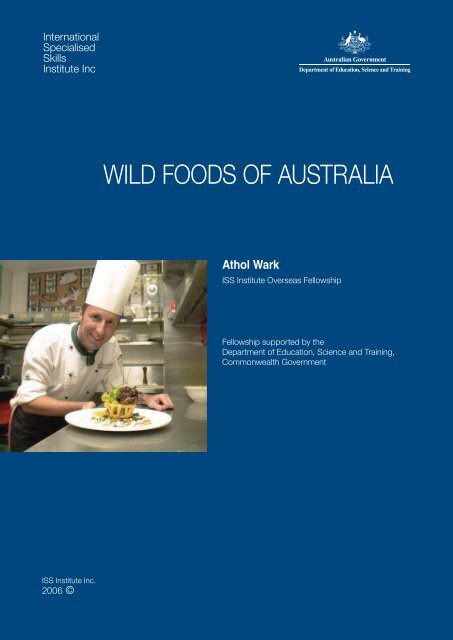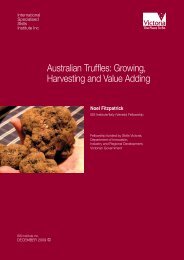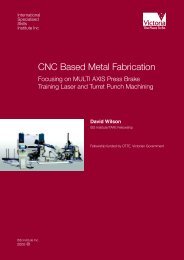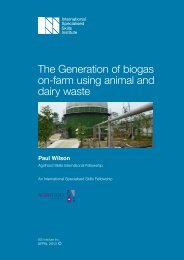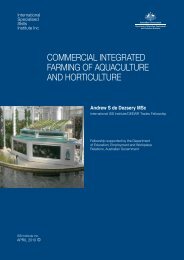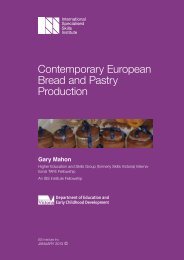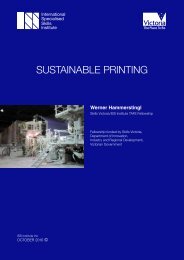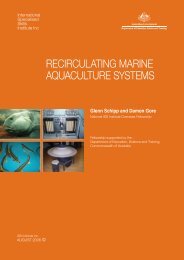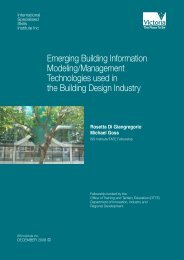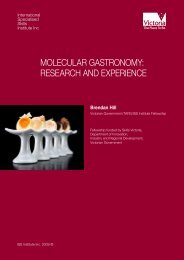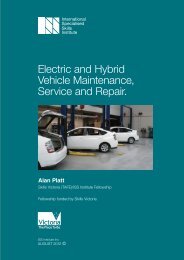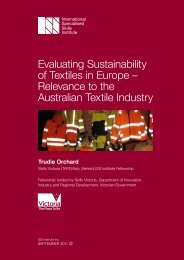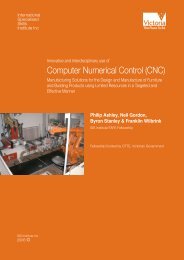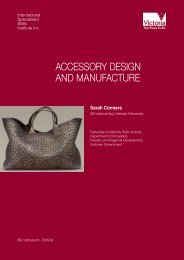wild foods of australia - International Specialised Skills Institute
wild foods of australia - International Specialised Skills Institute
wild foods of australia - International Specialised Skills Institute
Create successful ePaper yourself
Turn your PDF publications into a flip-book with our unique Google optimized e-Paper software.
<strong>International</strong><strong>Specialised</strong><strong>Skills</strong><strong>Institute</strong> IncWILD FOODS OF AUSTRALIAAthol WarkISS <strong>Institute</strong> Overseas FellowshipFellowship supported by theDepartment <strong>of</strong> Education, Science and Training,Commonwealth GovernmentISS <strong>Institute</strong> Inc.2006 ©
Published by <strong>International</strong> <strong>Specialised</strong> <strong>Skills</strong> <strong>Institute</strong>, Melbourne.ISS <strong>Institute</strong>101/685 Burke RoadCamberwell 3124AUSTRALIA2006Also extract published on www.issinstitute.org.au© Copyright ISS <strong>Institute</strong> 2006This publication is copyright. No part maybe reproduced by any process except inaccordance with the provisions <strong>of</strong> theCopyright Act 1968.Whilst this report has been accepted by ISS <strong>Institute</strong>, ISS <strong>Institute</strong>cannot provide expert peer review <strong>of</strong> the report, and except as maybe required by law no responsibility can be accepted by ISS<strong>Institute</strong> for the content <strong>of</strong> the report, or omissions, typographical,print or photographic errors, or inaccuracies that may occur afterpublication or otherwise. ISS <strong>Institute</strong> do not accept responsibilityfor the consequences <strong>of</strong> any action taken or omitted to be taken byany person as a consequence <strong>of</strong> anything contained in, or omittedfrom, this report.2
Table <strong>of</strong> Contents1. AcknowledgementsAwarding body - ISS <strong>Institute</strong> 5Fellowship sponsor/s 7Fellowship contacts 7About the Fellow 8Identification <strong>of</strong> <strong>Skills</strong> Gaps 92. The Australian Context 10Identification <strong>of</strong> skills gap questionsThe Australian Context ‘vision statement’Value adding to ‘<strong>wild</strong> <strong>foods</strong>’ <strong>of</strong> Australia.The <strong>Skills</strong> Gap - current situation.3. The Fellowship ProgramThe <strong>International</strong> Context 12The Overseas Destinations 154. Findings 24Outcomes to the Fellowship programKey issues and analysis,5 Recommendations 26The Opportunity: what will be gained/lost ? 27The Problem: skills gaps – 28The Solution: What do we need to do! 29Future <strong>Skills</strong> gaps, issue in the action plan. 316 Attachments 32+Overseas Venues”Sample menus.Supporting documentsThe development <strong>of</strong> recipes towards the best use <strong>of</strong> ‘<strong>wild</strong> <strong>foods</strong>’3
Education & trainingPro-start; Recommendations to the industryExcellence in workforce, rubrics toolMediaReports, articles <strong>of</strong> the ISSI and my experiences.4
1. AcknowledgementsAwarding Body<strong>International</strong> <strong>Specialised</strong> <strong>Skills</strong> <strong>Institute</strong>The <strong>International</strong> <strong>Specialised</strong> <strong>Skills</strong> <strong>Institute</strong> fills gaps in industries andenterprises where the means <strong>of</strong> doing so are not available throughgovernment programs or Australian TAFE <strong>Institute</strong>s and Universities.ISS <strong>Institute</strong>Explores opportunities in design and skills (traditional and leading edge)and identifies knowledge gaps towards establishing a range <strong>of</strong>collaborative projects with industry, pr<strong>of</strong>essional associations, firms,education and training institutions and government.Identifies experts in diverse areas <strong>of</strong> design, master level trades andpr<strong>of</strong>essional occupations in established and emerging industry sectorswith the intent to affect their services to conduct a range <strong>of</strong> educationand training activities such as workshops, lectures and exhibitions.The way in which this is achieved is by building global partnershipsthrough the Fellowship program, then the fellow sharing what he/shehas learnt overseas through education and training activities – onefellowship; many benefits.ISS <strong>Institute</strong>s operations are directed towards bringing knowledge andleading edge technologies to Australian industry, business andeducation/training institutes, rebuilding specialised skills andknowledge, which are disappearing, or have been lost in order to buildthe capabilities <strong>of</strong> industry and business and to maximise opportunitiesin the global and local marketplace.The result <strong>of</strong> their work has been highly effective in the creation <strong>of</strong> newbusiness enterprises, the development <strong>of</strong> existing business and the return<strong>of</strong> lost skills and knowledge to the workforce, thus creating jobs.Enormous benefits can be gained from working with ISS institutethrough their overseas Fellowship program, education and trainingactivities. Since 1999, the Victorian government, through OTTE, hasfinancially supported ISS <strong>Institute</strong>, as its major sponsor.ISS <strong>Institute</strong> proudly acknowledge the following sponsorsKnowledge & <strong>Skills</strong> Victoria, Victorian Government5
DEST, Australian GovernmentPratt FoundationVictorian UniversityRMIT UniversityPro Bono SponsorsBlake Dawson Waldron Legal ServicesErnst & Young Financial AccountingKPMG Financial AuditingBuchan Communication ServicesConnecting Point IT ServicesIn November 2004, I was the recipient <strong>of</strong> an overseas <strong>International</strong><strong>Specialised</strong> skills institute, DEST winner, to undertake a program in“<strong>wild</strong> <strong>foods</strong> <strong>of</strong> Australia.”<strong>Skills</strong> gaps were identified through my close association with my mentorsand contacts in the industry and government agencies over a period <strong>of</strong>three years. Over this period the opportunity to develop skills andknowledge in “<strong>wild</strong> <strong>foods</strong> <strong>of</strong> Australia” was not encountered with thepossibility <strong>of</strong> using this capability into a useful skill which could berevived and translated into a culinary uniqueness and a fusion <strong>of</strong>flavours using “<strong>wild</strong> <strong>foods</strong>” produce with today’s cookery methods &and how to make “<strong>wild</strong> <strong>foods</strong>” ingredients viable and sustainable intoday’s market place.In 2001 after commencing as Executive Chef <strong>of</strong> the Alice SpringsConvention Centre, I was introduced to Murray Hird, Director <strong>of</strong>industry development, DBIRD, Mike Crowe, Desert Knowledge,networking and communications manager. Phil Anning, regionaldirector <strong>of</strong> Central Australia, DBIRD and Mike & Gayle Quarmby <strong>of</strong>Outback pride, Reedy creek nursery to mention a few who influencedmy direction into “<strong>wild</strong> <strong>foods</strong>” and the starting up <strong>of</strong> the CentralAustralian food group and pioneering, “<strong>wild</strong> <strong>foods</strong>” in a commercialcookery in both restaurant and banqueting concepts. This has provenhighly successful for me and for the environment I have worked in.The undertaking <strong>of</strong> this pioneering journey in “<strong>wild</strong> <strong>foods</strong>” has providedme with hands on experience <strong>of</strong> the skills gap within the commercialcookery “<strong>wild</strong> <strong>foods</strong>” industry and has strengthened my resolve too seethe scope <strong>of</strong> the “<strong>wild</strong> <strong>foods</strong>” adapted into both a culinary uniquenessand a fusion <strong>of</strong> flavours using “<strong>wild</strong> <strong>foods</strong>” produce with today’s cookerymethods and how to make “<strong>wild</strong> <strong>foods</strong>” ingredients viable andsustainable in today’s market place.6
Fellowship SponsorDEST: The Department <strong>of</strong> Education, Science and TrainingDEST provides national leadership and works in collaboration with theStates and Territories, industry, other agencies and the community insupport <strong>of</strong> the Government’s objectives. They develop and implementpolicies to ensure the continuing relevance <strong>of</strong> education, science andtraining to contemporary needs and the growing requirement forlifelong learning. They also ensure high quality and value for money indelivering Government funded programs<strong>International</strong> Organisations & MentorsDavid Doepel,President, Taste Down Under, Miami, Florida USAChris Wagner,Certified German Master Chef, Director <strong>of</strong> Culinary Arts Education,Johnson & Wales University, Miami, Florida USADonald McGregor, President, Johnson and Wales University,Miami, Florida USALoreen Chant, Vice President, Johnson and Wales University,Miami, FloridaUSAFaculty Members, Johnson and Wales University, Miami, FloridaUSAInfluential OrganisationsCSRIO, Dr Maarten Ryder, Senior Research ScientistCSRIO Land & Water AdelaideArid Zone Research <strong>Institute</strong>, Mr Phil Anning,Regional Director, Central Australia, Alice Springs NTDBIRD, Mr Murray Hird,Director Industry Development, NT Government, Darwin NTDesert Knowledge, Mr Mike Crowe,Networking and Communications Manager, Alice Springs, NTOutback Pride, Mike & Gayle Quarmby,Reedy Creek Nursery, SARobins Foods, Ms Juleigh Robins,Director Robins Foods, Melbourne, VicJohnson & Wales University, Miami, Florida, USA,Chris Wagner, Director <strong>of</strong> Culinary Arts.Taste Down Under, Mr David Doepel,President, Miami, USA7
About the FellowThe ISS <strong>Institute</strong>/DEST Overseas Fellowship 2004 was awarded toAthol Wark <strong>of</strong> Charles Darwin University, Alice Springs NT, toundertake an overseas study program to gain a comprehensiveundertaking in promoting ‘<strong>wild</strong> <strong>foods</strong> <strong>of</strong> Australia’ to a global market.Adapting ‘<strong>wild</strong> <strong>foods</strong> <strong>of</strong> Australia’ into a culinary uniqueness and afusion <strong>of</strong> flavours using ‘<strong>wild</strong> <strong>foods</strong>’ produced with today’s cookerymethods and how to make <strong>wild</strong> <strong>foods</strong> ingredients viable and sustainablein today’s market place.Over a career <strong>of</strong> more than 15 years Athol has gained a breadth <strong>of</strong>experience, qualifications and assumed substantial responsibility inkitchen management, business and administration, teaching andtraining. These areas have been integrated throughout his career into anholistic approach encompassing knowledge, skills and insights acrosstrades and pr<strong>of</strong>essional fields. This advantage provides a uniquedeveloped and implemented using logical and lateral thinking process.Throughout his career Athol ha continued to build partnerships andstrategic alliances within industry, education and training institutes,government agencies, pr<strong>of</strong>essional associations and community groupsin Australia and <strong>International</strong>ly.Athol joined Beaufort Hotels in 1987 as a Chef de Partie, ChefTournant, in the capacity <strong>of</strong> opening team member, Darwin andBrisbane properties. Since then he has worked for Conrad Hilton Hotelsand Marriott Hotels in senior kitchen management roles.In addition to, and at times concurrently, with industry, Athol hasworked as a culinary consultant, as an educator with private providersand with TAFE at national and at a local levels, hospitality and cookery,(lecturer and delivery)Currently Athol is working for himself at "Warkabout Consultancy". Heis responsible for initiating, developing and implementing all aspects <strong>of</strong>the business encompassing market research to identifyIndustry/Commerce, training and development <strong>of</strong> kitchen teams andknowledge gaps, education, training, special events and exhibition,undertaking strategic marketing campaign (AusTrade) and consultancyservices.Away from this, Athol's interests are travel, gardening, designing newunique menu, along with his wife Lisa and two children, Hamish andSavannah, being a family after a busy time away. Living life and havingfun, taking all that life has to <strong>of</strong>fer and its opportunities.8
Identification <strong>of</strong> <strong>Skills</strong> GapsWild Foods <strong>of</strong> AustraliaTo undertake an overseas study program to gain a comprehensiveundertaking in promoting “<strong>wild</strong> <strong>foods</strong> <strong>of</strong> Australia” to global market.Adapting, “<strong>wild</strong> <strong>foods</strong> <strong>of</strong> Australia” into a culinary uniqueness and afusion <strong>of</strong> flavours using “<strong>wild</strong> <strong>foods</strong>” produce with today’s cookerymethods and how to make “<strong>wild</strong> <strong>foods</strong>” ingredients viable andsustainable in today’s market place.Identify and develop unique flavours in order to present to the world anAustralian food identity.The establishment <strong>of</strong> Australian cuisine based on the momoidentification <strong>of</strong> “<strong>wild</strong> <strong>foods</strong> <strong>of</strong> Australia” use world information ontastes, gets chef formulation on this.Development <strong>of</strong> recipes directed towards the best use <strong>of</strong> the “<strong>wild</strong> <strong>foods</strong><strong>of</strong> Australia” fruit and meats and vegetables, seafood etc….A comprehensive study into the use <strong>of</strong> the “<strong>wild</strong> <strong>foods</strong>” herbs and spices.The education <strong>of</strong> young Australia chefs, into the use <strong>of</strong> “<strong>wild</strong> <strong>foods</strong> <strong>of</strong>Australia”.Identification <strong>of</strong> individual regionalized “<strong>wild</strong> <strong>foods</strong> <strong>of</strong> Australia”cuisines in other parts <strong>of</strong> the world and what influenced theirdevelopment, thereby transferring that process to Australian <strong>wild</strong> <strong>foods</strong>cuisine.Nutritional properties and organic cultivation <strong>of</strong> “<strong>wild</strong> <strong>foods</strong> <strong>of</strong>Australia” needs to be found/research and thus used as a marketingtool.Sustainable “<strong>wild</strong> <strong>foods</strong>” produce systems for the nation.Communicate with all stakeholders, inclusive <strong>of</strong> indigenous peoples,along the Value Chain to identify food types, nutritional properties,harvesting, collecting and storage and other requirements.9
2. The Australian Context “Vision Statement”Value adding to “Wild Foods <strong>of</strong> Australia”Vision statementA demand driven ‘<strong>wild</strong> food” industry that has a strong national(Australia) participation to build, sustain, and improve, partnershipsbetween designers, artisans, trade and pr<strong>of</strong>essional people to create newproducts and uses with clear benefits national towards an innovate andproductive future for Australia in new world markets, globally.Definition <strong>of</strong> “<strong>wild</strong> <strong>foods</strong>”Any food item produced nationally, which has unique qualities, (taste,texture and nutritional value) and has a “value add” to the world marketBackgroundMain/targeted, commercial ‘<strong>wild</strong> <strong>foods</strong>”Wattle seed, Macadamia nuts, Barramundi, bush tomatoes, bananaprawns, worrigal greens, and camel to mention a fewEmerging industryproblem <strong>of</strong> matching supply and demandAcross the food industry value chainActivities and issues include: Wild harvest, horticultural production,genetics and plant improvement.Post harvest issues, markets and consumer issues.Current situationCommercial activityWild <strong>foods</strong> <strong>of</strong> Australia has a niche market in the food industryDefine scope and location <strong>of</strong> activityWild harvest activitySpecific localities, erratic yield <strong>of</strong> some speciesHorticultural productionWhat are the best systems, harvest methods and plant materialuse?Genetics and plant improvementNo current genetic modification needs to be all- natural formarketingJust begun, flavour variation/ taste preferenceProblems with long term storage10
Needs to be solved/how/in what, how long etc….? best treatments andor conditions for storage to avoid pest problemsTransportation <strong>of</strong> produce needs to be matched with what products arebeing produced to maintain freshness and long life (maintain) <strong>of</strong> theproductWhat is affected by post harvest treatment to the product on its quality?What quality standards will be useful for “<strong>wild</strong> <strong>foods</strong>”Market consumer issuesWhat is the size <strong>of</strong> the industry in the <strong>wild</strong> <strong>foods</strong> <strong>of</strong> Australia and whatare the trends in harvest & sales?What are the main specific blocks to the market development? Identifythe markets we want to penetrate into what is viableConsumerIdentify taste preferences for the targeted “<strong>wild</strong> <strong>foods</strong>”. Make the tasteuniversal, meet all global palates.Goals and objectives <strong>of</strong> “<strong>wild</strong> <strong>foods</strong>”Assist the industry to expandDefine the size <strong>of</strong> the targeted industry and industry trends.Work across value chain for new opportunitiesBranding/marketing issues to addressSolve problems in production and storage <strong>of</strong> produce.Main focus on – Barramundi, wattle seed, camel, bush tomato,macadamia nuts, worrigal greens, banana prawns to mention a fewAssist the sustainability <strong>of</strong> <strong>wild</strong> harvestDevelop effective post harvest storage methodsCreate opportunities throughPlant improvementModified plant production systemsSupply chefs creativity <strong>of</strong> product usedSustainability/volumeMarketing these unique Australian ‘<strong>wild</strong> <strong>foods</strong>” branding to the worldWild <strong>foods</strong> <strong>of</strong> Australia Research and DevelopmentSix common principals <strong>of</strong> participatory research (research fordevelopment)Agenda & problem definition by and with stakeholders.Must build stakeholder capacity (analytic capacity, problem – solvingskills)Combination <strong>of</strong> both scientific knowledge and empirical knowledge.Negotiation among all stakeholders about usefulness and relevance <strong>of</strong>results as a basis for action.Procedures for monitoring, feedback and learning are part <strong>of</strong> researchprocessLocal control over research priorities and practice in local area11
3. The Fellowship Program – <strong>International</strong> ContextMy initial research indicated the direction <strong>of</strong> the studies; uponfurther investigation it was revealed that there were many schools andInstitutions around the world. The original objective was to participatein as many courses available in a given time frame and budgetaryrequirements. Distance, time zones on the other side <strong>of</strong> the world,course cost and the location and prices <strong>of</strong> accommodation becameobstacles throughout this initial research.In the beginning research showed that Johnson & Wales CulinaryUniversity had the most potential for my required needs. However, afterseveral email conversations it became evident that the school was able tosupport my skills gaps questions.The research was broadened to most <strong>of</strong> the states resulting in an array <strong>of</strong>possibilities and the lolly shop syndrome surfaced. Help from “tastedown under”, David Doepel, Miami resulted into more doors opening.This proved to be an invaluable assistance in determining my fellowshipdirection. There were many courses on <strong>of</strong>fer to meet the areas <strong>of</strong>training however requiring many courses that could be scheduled withina month became crucial, courses undertaken from this involved researchwereAdapting “<strong>wild</strong> <strong>foods</strong> <strong>of</strong> Australia” into a culinary uniqueness and afusion <strong>of</strong> flavours using “<strong>wild</strong> <strong>foods</strong>” produce with today’s cookerymethods and how to make “<strong>wild</strong> <strong>foods</strong>” ingredients viable andsustainable in today’s market place.Continuous correspondence reaffirmed my position in the courses.NetworkingThe support <strong>of</strong> past fellowship recipients proved invaluable in being ableto form the itinerary.The networking with fellows became an important part <strong>of</strong> the mentoringprogram from planning to conquer.The BudgetBudgetary constraints remained the focal point in regards to this initialitinerary. The support from Chris Wagner, Director <strong>of</strong> CulinaryEducation, Johnson & Wales University, Miami, Florida, USA, DavidDoepel, President, Taste Down Under, Miami Florida, USA wasinvaluable in maximising further pr<strong>of</strong>essional development from thisfellowship. The most important aspect <strong>of</strong> this maximisation <strong>of</strong> furthereducation only became possible through a confirmed <strong>of</strong>fer <strong>of</strong>accommodation via great friends and supporters. From a budgetarypoint <strong>of</strong> view this allowed further money for learning opportunities.12
Educational/Host organisation outlinesJohnson and Wales University, North Miami, FloridaThe Florida Campus established in 1992, is located in the heart <strong>of</strong> NorthMiami, between Fort Lauderdale, with South Beach to the South beachto the south. Majestic palms line the Florida Campus where over 2300students are enrolled in the college <strong>of</strong> Business, the college <strong>of</strong> culinary artsand the hospitality college, yet its still small enough that faculty andadministrators remember your name Florida was the chosen campus tohost the first golf major as a concretisation in thesports/entertainment/event management program.The associate degree program in culinary arts provides students withpractical education in food production, while developing pr<strong>of</strong>essionalismand excellence in academic achievement, student’s progress through aprogram <strong>of</strong> study that builds pr<strong>of</strong>icies in food production and cooking andfood marketing. Hands on training are paired with traditional academiccourses resulting in a curriculum that delivers both dynamic and directlyaligned with industry needs.Johnson and Wales University is known as America’s career University. Avast array <strong>of</strong> educational degrees and diplomas can be viewed athttp://www.jwu.edu/Taste Down UnderWelcome to Taste Down UnderThey state they are dedicated to bringing you the most fantasticopportunities to do with Australian. They <strong>of</strong>fer access to Australianpremium ingredients and products in the US: seafood, meats, wines,spices (like wattle seed, bush tomatoes, Rozella), artisan Australiancheeses, Australian designed chefs knives and Australian designed andbuilt BBQs and other speciality products.They also <strong>of</strong>fer escorted culinary tours and nature tours to Australia.For more than fifteen years they have been helping Americans discoverthe Tastes <strong>of</strong> Down Under. They are now concentrating all <strong>of</strong> that hardto-findinformation and learning into this one website.Here you will be able to find out about Australian Seafood and how it isconsidered to come from one <strong>of</strong> the best-managed fisheries on earth. Forexample, did you know that from 1 st January 2005 any seafood from13
Australia that you find in the US must be from a sustainable source(otherwise it can’t be exported)? www.tastedownunder.com14
The Fellowship Program – The Overseas DestinationsJohnson and Wales University, North Miami Campus,Florida, USAMy initial research indicated to me the direction <strong>of</strong> my studies to choose.The original objective was to participate in as many courses available ina given timeframe and budgetary requirements. Johnson and WalesUniversity had the mast potential for my required needs. Chris Wagner,Director <strong>of</strong> Culinary Arts, Miami North Campus provided me withinvaluable assistance in determining my fellowship direction. Thesewere many courses on <strong>of</strong>fer to meet the areas <strong>of</strong> training howeverrequiring many courses that could be scheduled within a month becamecrucial, courses undertaken from this involved research were: -New World CuisineClassical FrenchNutritionStocks and SaucesPastry and BakingHow to motivate the unmotivated student.Continuous correspondence reaffirmed my position in the courses.The support <strong>of</strong> post fellowship recipients proved invaluable in being ableto form the itinerary, meeting with Chris Wagner, Dr Rice, LoreenChant and other executives from Johnson and Wales, even from thePresident Mr Donald McGregor, reaffirmed my choice was correct instudying at Johnson and Wales, North Miami Campus.David Doepel from Taste Down UnderMy meeting with David Doepel from Taste Down Under, was also agreat leverage to show case my skills and cuisine <strong>of</strong> value adding toregional produce, exposure from Taste Down Under included: -Presentation at the Australian Embassy, Washington to theUS Botanical Gardens.Dinner for Peter Baxter, Deputy Chief <strong>of</strong> Mission, Embassy <strong>of</strong> Australia,Washington.Johnson and Wales university Campus, Food & Beverage Departmentnationally, Providence, Rhode Island.NBC TV show, cooking live with Colin Hay (Men at Work)Show Case lunches with Hotel Conrad <strong>of</strong> the “<strong>wild</strong> <strong>foods</strong>” cuisine.Show Case Dinner with Hotel Conrad <strong>of</strong> the “<strong>wild</strong> <strong>foods</strong>” cuisine.Gala Dinner, presentation <strong>of</strong> the awards “Taste Down Under” at HotelConrad Miami.Cooking Class at Hotel Conrad Miami <strong>of</strong> “<strong>wild</strong> food” cuisine.15
The link with Taste Down under, was the public’s exposure to thiscuisine flavour <strong>of</strong> “Wild Foods” to gauge their response, and to see ifthere where markets to pursue.OutcomesDuring my varied presentations <strong>of</strong> my cuisine, the audience was veryaccepting <strong>of</strong> the “Wild Foods” <strong>of</strong> Australia was met with standingovations at the end, this was an overwhelming endorsement that themarket is ready to accept this uniquely Australian Cuisine, in the UnitedStates.The people where so interested to learn where, when, how, abouttheses varied unique flavours and spices, also the big questionwas where can we buy these ingredients?? So there is an exportmarket available out there for this value adds to regional produce.Destinations; Educational and Host OrganisationsWEEK 1 First Destination: - Johnson and Wales University,North Miami Campus Florida,Mr Donald McGregor, President <strong>of</strong> the North Miami Campus and aFacultyMeeting with Chris Wagner, Master German Chef, Director <strong>of</strong> CulinaryArts, Staff Students and tour <strong>of</strong> property.ObservationsA very compact, pr<strong>of</strong>essional and well organised culinary Campus.A day training program on each element <strong>of</strong> culinary comply i.e.: - aday on stocks and sauces, new world cuisine, garden manager, Basicpastry, Baking, nutrition etc…. methods <strong>of</strong> cookery a four (4) day weekprogram: - a two (2) week and one (1) day rotation. Classes <strong>of</strong> 18 – 20students very detailed and very organised systems here it was amazing tosee and very inspiring.I gave talks on my culinary philosophy and my style <strong>of</strong> cuisine and livedemonstrations to the students. I shadowed the culinary instructors andwas able to interact with the students, and to present to the ISSI Board aphysical explanation on how Johnson and Wales operates and itssystems as there is too much material to put in here, for people to relateto (see video presentation).WEEK 2 Second Destination: Washington D.C.A demonstration on“<strong>wild</strong> <strong>foods</strong>”<strong>of</strong> Australia, to the US NationalBotanical Gardens at the Australian Embassy. Ingredients targetedwere; wattle seed, lemon myrtle, walka pukha bukha, WA lobster, RoyalTasmanian salmon, Kurjer, (bush tomato). This occasion was to mark100 years <strong>of</strong> the US National Botanical Garden, so very influentialguests were in attendance.16
ObservationsA very attentive audience, lots <strong>of</strong> questions asked about the ingredients,the flavours, its availability in the USA, a very positive response from theaudience, the demonstration was scheduled for 1 _ but ran into 2 _hours, a standing ovation at the end, indicating the event a success.Third Destination Providence Rhode IslandA show case dinner for 30 <strong>of</strong> Johnson and Wales Food and BeverageDepartment, nationally, 5 Campuses.With Australian “<strong>wild</strong> <strong>foods</strong>” cuisine at Providence, Rhode Island. Themenu targeted; wattle seed, lemon myrtle, walka pukha dukha, WAlobster, Royal Tasmanian salmon the kurjer (bush tomato). A verydemanding audience <strong>of</strong> Johnson and Wales top Food and Beverageteam.ObservationsA very interesting audience, a group <strong>of</strong> people who know their food andflavours, what I call my industry peers. A standing ovation indicated theevent hit its mark and was very well received and all objectives met.Fourth Destination, Washington D.C.A presentation dinner for Peter Baxter: Deputy Chief <strong>of</strong> Mission, for theAustralian Embassy. To show case “<strong>wild</strong> <strong>foods</strong>” to the US Congressmen and women <strong>of</strong> what can be done by value adding to regionalproduce 22 high pr<strong>of</strong>ile guests ingredients targeted where; -; wattle seed,lemon myrtle, walka pukha dukha, WA lobster, Royal Tasmaniansalmon the kurjer bush tomato etc….ObservationsAttendees at this dinner included very demanding influential law maker,policy makers, and people in power group <strong>of</strong> audience.An audience that was unforgiving if things failed.As a result, the dinner was an outstanding success, a standing ovationyet again and a very impressed audience, lots <strong>of</strong> questions about theingredients, flavours, where could stock ingredients be brought and avery appreciative audience. The goals and objectives yet again wheremet, as this audience loved the style <strong>of</strong> <strong>foods</strong> and what could be done to“value add to regional produce”.WEEK 3 Destination Miami Johnson and Wales UniversityA continuation <strong>of</strong> new world cuisine in the morning and <strong>of</strong> shadowingthe nutrition classes in the afternoon. Students utilised the herbs andspices I provided to incorporate into their menu’s, I also made a videoand film documentation on their storage and faculty facilities. I was ableto coach, and mentor the students during my time here. Everythingwas made available to me for these results to be gained.Pro start: Orlando, national finals high school feeder group17
ObservationsThe style <strong>of</strong> the 9-day rotation program works well, in that you see thegrowth and confidence came out over the 9-day period, culminating onthe last day with amazing results. So much detail is covered on thegiven topic during this time, all recipes are on public folders and allassignments and tests are all electronic, making for a faster smootherand more efficient turnaround. Faculty facilities, laboratories are secondto none, and packed with all the best equipment needed. High Studentdiscipline is expected here at Johnson and Wales, resulting in verypolished and ready candidates for the job market. Students are veryconfident will be able to meet the challenges <strong>of</strong> this changing industry,pro start, and national finals, see Hand Book on Rule Book.WEEK 4 Destination Hotel Conrad MiamiA destination dinner menu at the Hotel Conrad Miami property at theirfine dining Alto’s Restaurant on Wednesday 24 th April, Show case “<strong>wild</strong>food” unique flavours to a top end Miami clientele Thursday 28 th April,TV show on NBC 6, South Florida today with Colin Hay (Men at Workfame) to promote Australian cuisine and product to the wide captive TVaudience Thursday 28 th cooking class <strong>of</strong> 20 to the Hotel Conrads topcorporate executives, to teach and taste the very best <strong>of</strong> “<strong>wild</strong> food”flavours, to educate them and to introduce them to the unique flavoursat a corporate level. On Saturday 30 th April guest Chef <strong>of</strong> the 3 rd annualTaste Down Under Competition Gala Dinner held at the HotelConrad’s Grand Ballroom160 persons in attendance. The dinner was inhonour <strong>of</strong> all TDU finalists and general public who love Australian foodand wine plus Miami’s industry top leaders in Tourism and Hospitality.ObservationsA top 5 star Hotel property, at Conrad being the flagship <strong>of</strong> HiltonHotels a new property, just 9 months old, with the very best locationand views <strong>of</strong> the harbour. This was a very demanding and tough foodand beverage department with very high expectations for itself and forits clients. The stakes where high as a guest-visiting Chef had neverdone this before, so these events had to succeed as reputation was atstake.The destination on the Wednesday was in the Alto’s Restaurant. Thiswas met with delight and a breath <strong>of</strong> fresh air to the many guests whowhere transported in time to Australia temporarily to taste these uniqueflavours. The 1 st international cooking class I held on Thursday nightfor the Hotels core clients in the corporate field was a resoundingsuccess, it ran 1 1/2 overtime. The guests were overwhelmed with thesenew tastes, Miami, Florida thrives on all things new and this hit the spot,and the Gala Dinner on Saturday was a standing ovation. All objectsand goals where superseded for both the cuisine and the Hotelsexpectations, there is a market in Miami.18
WEEK 5, Destination Miami Johnson and Wales University MiamiTime to wrap up my draft Fellowship findings, say goodbye to facultyand senior management and also to staff who had been such an integralpart <strong>of</strong> my 5 weeks away from home and who had given me so manyeducative and life learning skills. Students were very supportive andwarmed to my culinary experience and what I had to bring to theFellowship.My time at Johnson and Wales, North Miami Campus, was one <strong>of</strong>learning, friendship and pr<strong>of</strong>essionalism. From the President, DrMcGregor to the students I gained so much, due to the fact, I guess Igave so much <strong>of</strong> myself to the Faculty, Students and Johnson and Wales,I was blessed and rewarded to fantastic outcomes and objectives.Johnson and Wales opened up to me and <strong>of</strong>fered the world for thisFellowship to succeed.A huge thank you to the Director <strong>of</strong> culinary operations, Chris Wagnerwho made this all possible for me, and to his Faculty Staff Johnson andWales enabled me to make a constructive decision and enabled me t<strong>of</strong>ormulate my views on my outcomes and findings through my lifelongskills and experience I was able to draw on.Outcomes to the Fellowship ProgramRelated to the skills gaps: -The experience <strong>of</strong> having been overseas again at this time in my careerand life has meant a great deal to my future and that <strong>of</strong> others that I amin contact with.This opportunity away has been for a specific reason and a at time whenI can most use the skills and knowledge I have gained to the benefit <strong>of</strong>the Tourism and Hospitality Industry in the Northern Territory andAustralia.The learning has purpose and I am able to put the identified skills gapsinto place with “the questions” as outcomes.Many ideas, techniques and knowledge were gained, as well as some lifelearning skills. The reality <strong>of</strong> being in another country with littleknowledge <strong>of</strong> people and culture, the networking processes and theability to take in all aspects <strong>of</strong> learning will be part <strong>of</strong> my life longlearning.19
The skills gaps identified and posed as questions and with outcomes asanswersQuestion 1Identity and develop unique flavours in order topresent to the world an Australian food identity?AnswerPlease refer to attached submitted samples <strong>of</strong> menusthat I have created and showcased to a wideraudience over the past 3 years.Audience variability ranged from people in the street,fellows pr<strong>of</strong>essionals, peers, corporate executives, andfoodies at large to people <strong>of</strong> power, and politicians.OutcomesThe feed back has been overwhelming and verysupportive and positive standing ovationsQuestion 2The establishment <strong>of</strong> Australian Cuisine based on theidentification <strong>of</strong> “<strong>wild</strong> <strong>foods</strong>” <strong>of</strong> Australia, use <strong>of</strong> worldinformation <strong>of</strong> tastes, gets Chefs formulation <strong>of</strong> this.AnswerThe tastes and formulation <strong>of</strong> the use <strong>of</strong> “<strong>wild</strong> native”dry ingredients in a value add to meats, seafood,poultry etc was very encouraging, people loved theexplosive unique flavours that was presented to them.OutcomesThere is a need, urgency to get these ingredients outinto the wider Supermarkets, Publics etc for the wideruse <strong>of</strong> the population.Question 3Development <strong>of</strong> recipes directed towards the best use <strong>of</strong>the “<strong>wild</strong> <strong>foods</strong>” <strong>of</strong> Australia fruits, meats and seafoodetc.AnswerPlease refer to the attached submitted samples <strong>of</strong>recipes that I have created towards this new “<strong>wild</strong><strong>foods</strong>” flavourOutcomesThe outcome has been overwhelming, students, generalpublic all want the recipes, to recreate these flavours.20
Question 4A comprehensive study into the use <strong>of</strong> the “<strong>wild</strong> <strong>foods</strong>and spices.AnswerThis comprehensive study into the use <strong>of</strong> the “<strong>wild</strong><strong>foods</strong>” herbs and spices is still developing through thework <strong>of</strong> Desert Knowledge, CRC, CSIRO, and otherstudy, Science organisations.OutcomesOutcomes to this are still evolving, as data is collectedand menus and recipes compiled. This is a work inprogress.Question 5The education <strong>of</strong> young Australian/USA Chefs, intothe use <strong>of</strong> “<strong>wild</strong> <strong>foods</strong> <strong>of</strong> Australia”.AnswerThis is currently being done with Johnson and WalesUniversity, North Miami Campus, Charles DarwinUniversity, Alice Springs Campus and together withthe Central Australian Food Group. The students arebeing introduced to the herbs and flavours and beingasked to create dishes with these flavours as the core <strong>of</strong>the product.OutcomesOutcomes are again ongoing as there is much still to doto get this education into the mainstream and nationalcurriculum.Question 6Identification <strong>of</strong> individual regionalized “<strong>wild</strong> <strong>foods</strong> <strong>of</strong>Australia” cuisine in other parts <strong>of</strong> the world and whatinfluenced their development, thereby transferring thatprocess to Australian <strong>wild</strong> <strong>foods</strong> cuisine.Geographical circumstances, and mixes <strong>of</strong> populationhave brought about answers to the closest identification<strong>of</strong> an individual regionalized cuisine has been Florabean, a mix <strong>of</strong> Florida and Caribbean cultures andflavours.OutcomesThe outcome <strong>of</strong> Flora bean Cuisine has been that younow have a cuisine encompassing a larger populationmass, all sharing in a common love <strong>of</strong> food and itsunique flavours. There are a lot <strong>of</strong> unique ingredientsfound in the Caribbean, and Florida that are poles21
apart for instance the plantain Bananas and the Floridacitrus orange. But put together in a cuisine are anintegral part. The same can be said for the “<strong>wild</strong>food” flavours now.Question 7Nutritional properties and organic cultivation <strong>of</strong> “<strong>wild</strong><strong>foods</strong> <strong>of</strong> Australia” needs to be found/researched andthus used as a marketing tool.AnswerThis is still ongoing through companies such as JuleighRobins, Outback Pride, Peter Yates and otherproducing firms.OutcomesThe outcomes to this are that when a nutritional ormedicinal property is found and linked to a “<strong>wild</strong> food”ingredient, and only when, this “<strong>wild</strong> food” and onlywhen is when this “<strong>wild</strong> food” ingredient will sky rocketand become more marketable to the world audience.People like to eat things that will have a cure forcancer, or make them feel more active etc until this isdone, then it will limit the value people see in theseunique ingredients and it will limit its market appeal.Question 8Sustainable “<strong>wild</strong> <strong>foods</strong>” produce system for the nation.AnswerSustainability is one other those buzz words that’sgetting a lot <strong>of</strong> attention these days from consumersand industry.Consumers are being taught to seek outenvironmentally friendly food choices. We need to findthe right balance between feeding the growingpopulation and preserving nature. A sustainableagriculture is ecologically sound, economically viable,socially just and humane.Mexico is a great example <strong>of</strong> being able to usesustainability to its benefit. Mexico is blessed, likeAustralia, with beautiful habitat, unique naturalvegetation and animal species and organisationsaround the world learn from their successes. TheMexican shrimp industry is a great example <strong>of</strong> theirsuccessful sustainability.OutcomesOutcomes, sustainability needs to be strictly controlled,there has to be a long history <strong>of</strong> protecting a species inorder to get it right and transfer it to other species. Asa result through this sustainable learning stocks can22
ecome stable, production becomes consistently highand yields great. Preventative measures need to be putinto place for targeted “<strong>wild</strong> food” ingredients, so thatthey may become sustainableAdditional OutcomesNetworking with pr<strong>of</strong>essional people from the industryproved to be beneficial for me and for the people <strong>of</strong>Alice Springs, Northern Territory. I received manyletters <strong>of</strong> thanks including those from Peter Baxter,Deputy Chief <strong>of</strong> Mission Washington, the AustralianEmbassy/John Quinn, Austrade Washington/Johnsonand Wales Providence and also Miami Campus/TasteDown Under David and Barbara Doepel/HotelConrad Miami, management and staff/Students <strong>of</strong>Johnson and Wales and the general public.Offers where made for me to return at any stage. I hadgained the respect from people whom I valued. I foundthat my passion for the industry, dedication to learningand observation skills gained the respect <strong>of</strong> these chefsdespite language barriers.The original itinerary set in hindsight was adventurous,I found that once I was on the path <strong>of</strong> discovery that Icould not achieve all my goals. As fate would have itthe path led to better learning experiences thanpredicted. I also became more aware that there areskills gaps in all areas <strong>of</strong> hospitality and in all the areas Ivisited, producing many items from the beginning tothe end was declining, explanation being, in manyplaces, time and monetary constraints incurred whenpassing on knowledge and specialised skills. Many <strong>of</strong>these facilities were facing the same challenges <strong>of</strong>training versus the dollar costs.23
4. FindingsOutcomes to the Fellowship ProgramRelated to the skills gaps:On my return to Alice Springs I held numerous radio interviews, namelyABC National and local radio, and Top FM (Territory) about my trip andfindings and was able to share myexciting experiences with fellow members<strong>of</strong> the Central Australian Food Group. I will continue to put my skills andideas <strong>of</strong> flavours <strong>of</strong> unique cuisine to good use in Melbourne at the goodFood and the Expo being held on the 17,18 & 19 th June, and promotingterritory barramundi, <strong>wild</strong> lime and lemon myrtle, cured barramundi,gravlax with anchovy mayonnaise and show casing wattle seed ice cream tomention a few. I also have the opportunity to work with world Expo inJapan, Aichi, in July and August 2005 again to show case and promote theseunique flavours to a world audience, and to value add product from a desertregion. In my capacity as Northern Territory Culinary ambassador I amalso being asked to talk about my experiences and findings, both to localgovernment and to a Department <strong>of</strong> Foreign Affairs and Trade, who havebeen most interested in the momentum and energy generated from mytravels.I have made mention <strong>of</strong> these recommendations and findings to my school,Charles Darwin University, Morag McGrath, so hopefully they may beimplemented and share the same vision as I am pursuingTo recap; the skills and knowledge gained from this wonderfulexperience as stated were both pr<strong>of</strong>essional and life longlearning they included :-1 The development and identifying <strong>of</strong> unique menus with flavours in orderto present to the world a uniquely Australian food identity.2 The establishment <strong>of</strong> Australian cuisine based on the identification <strong>of</strong>“<strong>wild</strong> <strong>foods</strong> Australia” and gaining approval from a world audience, i.e.USA market, on tastes and the Chefs approval and formulation on this inthe form <strong>of</strong> recipes etc.3 The development <strong>of</strong> recipes directed towards the best use <strong>of</strong> the “<strong>wild</strong><strong>foods</strong> <strong>of</strong> Australia”, fruits, meats, vegetables and seafood etc.The comprehensive study and its versatility and experimenting into the use<strong>of</strong> the “<strong>wild</strong> <strong>foods</strong>” herbs and spices into a culinary medium. Feedbackfrom the students was amazing.24
The education <strong>of</strong> young enthusiastic Australian, USA Chefs, into the use <strong>of</strong>“<strong>wild</strong> <strong>foods</strong> <strong>of</strong> Australia”, is an ongoing process, Charles Darwin University,Johnson and Wales, Hobby Classes and being a NT Culinary Ambassadoras a few examples <strong>of</strong> how I was able to pass on my knowledge andenthusiasm.The identification <strong>of</strong> individual regionalized “<strong>wild</strong> <strong>foods</strong> <strong>of</strong> Australia”cuisines in other parts <strong>of</strong> the world and what influenced their developmentthereby transforming that process to Australian <strong>wild</strong> <strong>foods</strong> cuisine.“New World Cuisine” is a great example <strong>of</strong> this identification <strong>of</strong> individualregionalized cuisines, i.e., French, Italian, English etc in other parts <strong>of</strong> theworld has influenced “<strong>wild</strong> <strong>foods</strong>” <strong>of</strong> Australia cuisine in the form <strong>of</strong> itstraditional methods <strong>of</strong> cookery methods, i.e. the fundamental basics <strong>of</strong>cookery, the worlds blueprint <strong>of</strong> how cookery globally is conducted, auniversal language, and it is this universal language that needs to betransferred to the “<strong>wild</strong> <strong>foods</strong> <strong>of</strong> Australia” as a cuisine if this is to grow.The nutritional properties and organic cultivation <strong>of</strong> “<strong>wild</strong> <strong>foods</strong>” <strong>of</strong>Australia needs to be found and researched and thus needs to be used as amarketing tool, Desert Knowledge & CSIRO etc research needs to beconducted.The need for sustainable “<strong>wild</strong> <strong>foods</strong>” produce system for the nation, region,Desert Knowledge, CSIRO needs work done on this.25
5. Recommendations are:Pro startThis is designed to start in High Schools, Senior educational facilities suchas TAFE’s, Universities need to visit High Schools and target selectivetraining show case events, two to three a year, on how to win a competition?And discuss the life and times <strong>of</strong> a Chef. Demonstration <strong>of</strong> cookingfundamentals done simply, looking at plate presentation, encouraging acompetitive discipline, is an exciting career option to the students to follow.Showing them the pr<strong>of</strong>essionalism that’s required through competitivenesswith a targeted food program (pro start) so when students hit, (enter) TAFE,University environment they are already up there and ready. This will givemore time to the lecturers to pass onto the students more details and moreadvanced training methods. We as an industry need to train and motivatethe Senior School Teachers on what is needed as a curriculum for thetertiary educational system to be more advanced and effective (see examplebooklet in Section 9).Intense TrainingThe industry needs to have a 2 year intense tertiary culinary educationsystem in place to compensate for this massive skills gap and brain drain in atight concise environment without corruption and interruption fromindustry, and once graduated the student can go out into the industry with afar more educational approach, idea <strong>of</strong> what is right and wrong, so thereforeis able to make a educational choice <strong>of</strong> knowing what is right and wrong,current situation <strong>of</strong> block release is that the students are already tainted withindustry short cuts, and bad sanitary practises and have generally low levels<strong>of</strong> expectation so when they arrive at the place <strong>of</strong> learning, TAFE/University the standards are high or sometimes not industry related andwe, as lecturers then have this battle with the students, lecturers about whatis right and wrong in the industry as the student is more greatly to beinfluenced in the work place 1 st then by the educational venue, we cannotexpect industry to be our educators, we need the universities and TAFE’s tomentor this and in a block release is not enough time is given to go overfundamentals, basics, hands on, so when the student goes back to industrythe continuity is broken and the cycle is broken as a result I see a poorcalibre <strong>of</strong> student graduating.26
StatusWe as an industry need to elevate the status <strong>of</strong> the Chef in the employmentindustry to higher levels to make it more attractive to recruit at thesecondary level and therefore retain the work force.Levels <strong>of</strong> excellence in the workforceWe need to create excellence in our grading system, at present we have CA(Competency Achieved) CF (Competency Failed) there is no motivation forthe A+ Student to achieve as they know that someone who has less abilitywill pass anyway, but someone with more ability will get the same mark,grade, so no room for excellence identification for the student + nomotivation.The best method is to have Fail below 60% student developing well 60% –70% (pass) validation 70% - 85% and mastering 85% A+ Student with thissystem excellence is assured see example <strong>of</strong> culinary Arts production skillsrubrics as a tool to implement.The OpportunityWhat will be gained should these gaps be met.There is a tremendous amount to be gained should these skills gaps be met:firstly let’s look at the opportunities.We have a TAFE group <strong>of</strong> keen and enthusiastic industry leaders in AliceSprings, that has and continues to identify and develop unique flavours andmenus in order to present to the world an Australian food identity. Theseare targeted to our local population and to the national/internationaltourists, by creating a destination brand <strong>of</strong> cuisine by bringing in ASS andthe creation <strong>of</strong> something unique to the region. The development andrecipes directed towards the best use <strong>of</strong> the “<strong>wild</strong> <strong>foods</strong> <strong>of</strong> Australia”produce and then its release out into the market place in the form <strong>of</strong> aculinary book etc to pass on the “how to” to the general public. There is ahuge opportunity for the culinary education system in the Territory to takehold <strong>of</strong> this uniquely outback cuisine and style and to encompass it into theeducation <strong>of</strong> young Australian chefs into the use <strong>of</strong> “<strong>wild</strong> <strong>foods</strong> <strong>of</strong>Australia”, opportunities lie in research into the nutritional properties andorganic cultivation <strong>of</strong> “<strong>wild</strong> <strong>foods</strong> <strong>of</strong> Australia: and also the research andplanning into the sustainability <strong>of</strong> these chosen “<strong>wild</strong> <strong>foods</strong>", ingredients,opportunities lie in the “destination marketing” <strong>of</strong> this cuisine for the regionand making it unique and creating job growth and bringing in the muchvalued A$, in terms <strong>of</strong> Tourism, and the creation <strong>of</strong> a food trail.What will be lost should these gaps not be metWell the opportunities lost should these gaps not be met will be a lot <strong>of</strong>vision and dedication to the course on behalf <strong>of</strong> a core number <strong>of</strong> peoplewhose potential and growth in our industry.27
It would, I believe, put Alice and regional NT on a backward decline ifthese skills were not met as a wasted opportunity to grow their communitiesinto a viable and sustainable identity, I believe regional NT needs to make“food” as its core identity and value add to it by its natural uniqueattractions <strong>of</strong> it’s surroundings, and basically the opportunities lost would beall the skills gaps and their outcomes so in a nut shell there is more to gainby embracing these skills and having the determination to be a leader andchallenge new ground.The Problem: - skills gaps and deficienciesWe have, as a region, lost our individuality we need to create ourselves, bymaking “food” our reason, among many, for us to create an identity, weneed to know why we visit places, it for the food, shopping, entertainmentetc until we answer this we will not know in which direction to go in.Conditions within the Hospitality Industry do not always allow forenthusiasm to develop or appreciation <strong>of</strong> a job well done.The focus <strong>of</strong> our challenges to face these problems are: -To encourage industry to invest in the future <strong>of</strong> our chefs and to encourageindustry to buy into the “<strong>wild</strong> <strong>foods</strong> <strong>of</strong> Australia” concept and how it couldbe good to their business to encompass “destination food” into their menus.To encourage and to teach chefs that to use these unique flavours will resultin the development <strong>of</strong> “new menus” and flavours to showcase to theirdiners.To encourage local government, industry leaders and regional councils thatthere is potential for market growth by embracing these new skills and toshare the vision and to take that next big step to change. Both to investfinancially and technically through research and development.The problems <strong>of</strong> supply versus demand, making these ingredients viable andsustainable and also looking at the past harvest issues <strong>of</strong> transportation andstorage and distribution <strong>of</strong> product in such a way that it becomes viable andeconomical to all users.The problems <strong>of</strong> which select few targeted “<strong>wild</strong> <strong>foods</strong>”, ingredients to start<strong>of</strong>f with, showcase and then run with them believing that they have the keysto start something new.28
The SolutionWhat do we need to do; suggested solutions to overcomethe challengesGovernment:Both Federal and Territory need to <strong>of</strong>fer incentives to businesses in theHospitality food industry to encourage their chefs to develop specialisedskills and knowledge outside <strong>of</strong> the set apprentice program.National, State and Territory Tourist Commissions to invest and marketheavily their support for a “<strong>wild</strong> <strong>foods</strong> <strong>of</strong> Australia” cuisine to a national andglobal market, to be world leaders in a new age cuisine, to be visionaryabout taking new opportunities as they arise.Pr<strong>of</strong>essional Development Funds:Funds made available for teachers to continue to enhance their level <strong>of</strong> skillsand knowledge.Education and Training:Develop a higher pr<strong>of</strong>ile <strong>of</strong> the chef <strong>of</strong> today (the chef being willingobviously) through the education <strong>of</strong> the consumer that it is an acquired skillto be able to create a master piece, and to appreciate the time and talentsacrifices made to create greatness.To investigate the training system <strong>of</strong> today, and the region and to ensurethat it enhances and meets the longevity and the local industry needs,through developing these new skills and knowledge development. To listento industry and to include any new skills into the current curriculum.The training system is a provider to the industry.Industry Bodies;To create the formation <strong>of</strong> international master chefs to be brought toAustralia, and it’s regions to help instil this culinary discipline and itsteachings to Australian culinary academics, namely Chris Wagner fromJohnson and Wales University, Miami Campus, Florida. This will then leadto the encouragement <strong>of</strong> apprentices and chefs to be part <strong>of</strong> an exchangeprogram both nationally and internationally, information sharing.The support from industry and learning institutions is necessary in order tosponsor talented individuals who are dedicated to their pr<strong>of</strong>ession, to studyoverseas.Work with Desert Knowledge Australia, in promoting this culinaryuniqueness to other desert regions <strong>of</strong> Australia and so as to enhance theirregions and therefore build a strong foundation both economically andeducationally and thereby creating jobs and life skills.29
Future Training, Seminars And Workshops:Plan and deliver, culinary ambassador, a variety <strong>of</strong> workshops to promoteadvanced techniques and skills that can be adapted into all areas <strong>of</strong> thenations tourism and hospitality sectors. Have an action plan that includes: -conferences, events, forums, workshop, seminars, and exhibitions, and inviteand meet with government/education bodies to advise <strong>of</strong> recommendations.Industry and Firms:Advanced skills and a striving for higher levels <strong>of</strong> skills need to be rewardedand recognised. The industry <strong>of</strong> today is too fast becoming a only job tomany, and few see it as a career path. Teaching observations indicates thatthis is also reflected through the workplace and in the employment <strong>of</strong> shortterm training. The industry is transient in regards to its employees. Thededication and commitment <strong>of</strong> the chef to the entire apprenticeship hasdeclined. This movement has contributed to the instability <strong>of</strong> the industry.The casual employment <strong>of</strong> chefs in the industry does not <strong>of</strong>fer security oropportunity for personal development. The opportunity for progression <strong>of</strong>chefs into highly skilled pr<strong>of</strong>essionals is limited to few. The attitude <strong>of</strong> theindustry and that <strong>of</strong> the consumer need to be changed through educationalworkshops and information sharing.Mentor the future: Educate and accelerateThe Role <strong>of</strong> ISSIThe ISS <strong>Institute</strong>’s Fellows mentoring program (past fellows link to newones) encourages and supports the development <strong>of</strong> skills and knowledgeacross a broad network. Many <strong>of</strong> the candidates regardless <strong>of</strong> theirfellowship origin are able to <strong>of</strong>fer support and valued information to otherrecipients.Continuing the meetings <strong>of</strong> recipients, and political leaders, outside <strong>of</strong> themajor awards events would ensure a more social form <strong>of</strong> getting togetherand on an informal basis. My recommendation would be a two to 3 dayworkshop whereby many recipients can pass on their skills and knowledgedirectly or converse on the many observations made while overseas, like amini ISS skills expo. The rotation <strong>of</strong> these around Australia would ensurethat those outside <strong>of</strong> the Metropolitan areas could contribute regularly; Iwould also like to see that those with similar interests and skills cometogether and share ideas and aspirations towards change.Mentoring in the workplace, pro start for example, with the aid <strong>of</strong>government incentives to ensure that the true needs <strong>of</strong> the industry and itsworkforce are met. The needs must be <strong>of</strong> a high standard so as to maintaincredibility.Promoting quality chefs who have left the industry and takes with them a30
wealth <strong>of</strong> skills and knowledge to become part <strong>of</strong> this mentoring program.The achievement <strong>of</strong> such an action plan is something that will take a greatdeal <strong>of</strong> time and effort, we have an industry that is not willing to share andtherefore changing attitudes to encourage healthy growth in the industry is apriority. The education <strong>of</strong> our students in their training and giving themthe skills to communicate ideas and techniques to fellow colleagues wouldplant the seed <strong>of</strong> growth for future managers and leaders in our pr<strong>of</strong>ession.Further <strong>Skills</strong> Gaps: - ISSI in the Action PlanThe abundance <strong>of</strong> knowledge gained from other ISS fellows before me inthe hospitality area must encourage the development <strong>of</strong> new models forchange.The development <strong>of</strong> a more structured regionally industry driven system isthe catalyst to such change with ISSI at the centre for communication, wewill be able to help build a network <strong>of</strong> pr<strong>of</strong>essionals from rural NT andnationally renowned institutes. The development <strong>of</strong> workshops for teachersto help each other learn new skills and knowledge will break down thecommunication barriers and ensure that we are all working towards thelong term goal in maintaining our specialized skills, once established wewould then showcase all <strong>of</strong> the skills that students have also developed, thelocations <strong>of</strong> these showcases would need to be incorporated into Desertregions <strong>of</strong> Australia. The Hospitality and Tourism community are thebeneficiaries.The vast knowledge already gained from past fellows and my fellowshipmust not be allowed to lie dormant, I would like to see that a futurefellowship <strong>of</strong>fer <strong>of</strong> bringing all <strong>of</strong> these ideas and knowledge together indeveloping the master levels.Overseas ExpertiseI recommend to invite to Australia Chris Wagner, Master German chef,Director <strong>of</strong> Culinary Arts at Johnson and Wales, North Miami Campus,Florida, to ensure that training continues to become our focal point. Thedevelopment <strong>of</strong> an exchange program with Johnson and Wales UniversityUSA, being on <strong>of</strong>fer for all apprentices at the successful completion <strong>of</strong> theirtraining can only add to our skills and knowledge for future generations.Observations <strong>of</strong> our industry indicate that a growing number <strong>of</strong> ourapprentices are starting out at a late stage in their lives, therefore I wouldencourage the industry, as ISS has, to make opportunities open to all ages,too many <strong>of</strong> our culinary competitions, having an age stipulation on these,competitions I feel that this is one <strong>of</strong> the reasons we are floundering in ourgrowth and attraction <strong>of</strong> people to the industry. The rewards are a necessityin our demanding careers.31
Further <strong>Skills</strong> Gaps: - ISS in the Action Plan.Promoting a global gastronomy identity for Alice SpringsThe importance <strong>of</strong> gastronomy as an icon for the town.Creating gastronomy trails.A world desert cuisine summit, a periodic meeting <strong>of</strong> international chefs andexperts from other “desert” backgrounds (not necessarily, however if comingto Alice Springs to do high cuisine) promoting a context <strong>of</strong> pristine nature,native food and culinary creativity with a touch <strong>of</strong> adventure.A Global research Centre on native gastronomy and tourism. Creating aninternational network <strong>of</strong> researchers, experts interested in the topics.Promoting a periodic conference on the issues related to the promotion <strong>of</strong>native food/gastronomy in relation to tourism.6. AttachmentsOverseas venuesJohnson and Wales Student feedback sheetsVideo <strong>of</strong> Johnson and Wales, North, Miami CampusChannel and video, post cards and art backVideo <strong>of</strong> “US National Botanical Gardens”Sample menusSample menus in developing unique flavours in order to present to theworldon Australian food identity.Supporting documentsThe development <strong>of</strong> recipes directed towards the best use <strong>of</strong> the “<strong>wild</strong><strong>foods</strong>”.Education & trainingPro-start - Recommendations to the industry.Excellence in workforce, rubrics toolMediaMedia reports, articles <strong>of</strong> the ISSI and my experiences.32
World potential for bush tucker mooted in Alice Springs - ABC News (Australian Broadcasting Corporation)28/10/10 10:23 AMWorld potential for bush tucker mooted in AliceSpringsPosted Wed Feb 2, 2005 3:19pm AEDTA speaker at a hospitality and tourism conference in Alice Springs says central Australia should become thenative <strong>foods</strong> capital <strong>of</strong> the world.Rosario Scarparto from Latrobe University in Victoria says there is a movement worldwide by people towards <strong>foods</strong>that have tastes unique to the regions they are found in.He says Alice Springs with its bush tucker is a new frontier for flavours and could become a gastronomic destinationfor tourists."Alice Springs can play a very huge role on an international level for this kind <strong>of</strong> thing, native gastronomy, desertgastronomy," he said.Meanwhile, Charles Darwin University academic and chef Athol Wark says the hospitality industry will have to workwith Aboriginal communities if Alice Springs is to make the most out <strong>of</strong> its bush tucker.Mr Wark says students will have to be taught how to include bush tucker into dishes if the market is to grow."We also need the Aboriginal community to embrace this and to share their culture and to really teach us the ways,"he said."Because obviously it's a very cultural sensitive situation and we need to respect that."Tags: food-and-beverage, indigenous-aboriginal-and-torres-strait-islander, food-and-cooking, alice-springs-0870© 2010 ABChttp://www.abc.net.au/news/stories/2005/02/02/1294419.htm?site=newsPage 1 <strong>of</strong> 1
US pollies get a taste <strong>of</strong> bush tucker fare - 10/05/200528/10/10 10:24 AMABC RuralUS POLLIES GET A TASTE OF BUSH TUCKER FARETuesday, 10/05/2005American politicians and lobby groups have been given a taste <strong>of</strong> Australian bushfood, thanks to Alice Springs chef Athol Wark.He has just returned from the US, where as an "international specialised skillsfellowship winner", he set about creating interest and new trade in our native fare.Mr Wark says the American visitors to the Australian embassy in Washington werewell travelled, but they had never tasted the sort <strong>of</strong> menu he prepared for them."I did a lemon and lime myrtle aniseed cured salmon gravlax then with a vodkashot on the side and this just went down a treat together with a wattle-seed icecreamwith a sticky balsamic syrup and a Sambuca jelly shot, a biscotti as wellmade out <strong>of</strong> wattle seed," he said."Wattle seed is not a c<strong>of</strong>fee but is actually a decaf. A great thing for those c<strong>of</strong>feeaddicts out there without the worry <strong>of</strong> being addicted."NATIONAL RURAL NEWSTop lawyer says Basin plan must put environment firstCalls for halt on GM wheat trialsInland river 'uncertainty'Bumper cotton crop predictedChestnut blight contained to NE VicCall to action over planned Alice mineNew frontiers for biodieselWet weather hampering locust fightFrost bites yield hopesBendigo seeks full ownership <strong>of</strong> Rural BankAussie wool prices bucking the trendABC Online Home Page© 2010 ABC | Privacy Policyhttp://www.abc.net.au/rural/content/2005/s1364174.htmPage 1 <strong>of</strong> 1
CDU Web for GoCDU Home | Web Tips | Contacts | Sitemap
Culinary ambassador to cook up international interest - ABC News (Australian Broadcasting Corporation)28/10/10 10:32 AMCulinary ambassador to cook up internationalinterestPosted Sat Mar 26, 2005 9:43am AEDTOne <strong>of</strong> the Northern Territory's two newly-appointed culinary ambassadors says he will take up the role almostimmediately when he travels to the US next week.Primary Industries and Fisheries Minister Kon Vatskalis has appointed Jimmy Shu, from the Hanuman Restaurant andAthol Wark, from Charles Darwin University's School <strong>of</strong> Hospitality, as culinary ambassadors for 12 months.Mr Vatskalis says both have used Territory ingredients to create localised recipes that can be used to promote tourism."Cuisine is a part <strong>of</strong> tourism," he said."People go to a place to see the scenery but if they taste the unique regional cuisine they will come back and back,and back again."Mr Wark says he will promote the Territory's unique tastes at food shows and competitions."I think there's definitely a need and a market," he said."I think now just really got to concentrate on the supply demand and getting the groundswell and education <strong>of</strong> chefsand food producers that there is merits in the development <strong>of</strong> this."Tags: travel-and-tourism, nt© 2010 ABChttp://www.abc.net.au/news/stories/2005/03/26/1331836.htmPage 1 <strong>of</strong> 1


